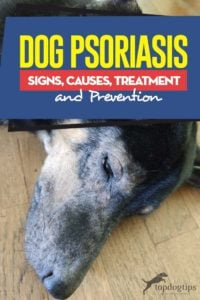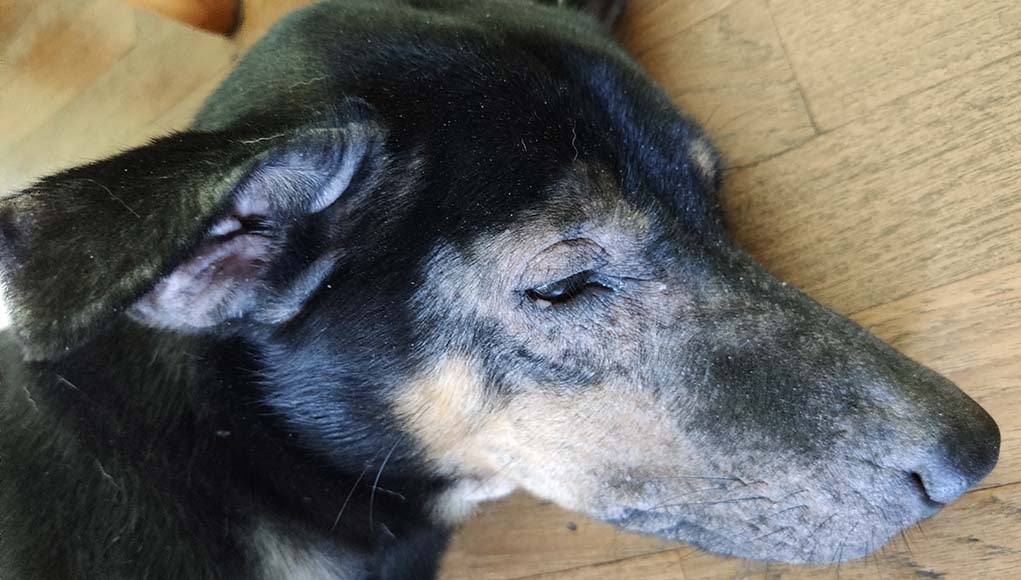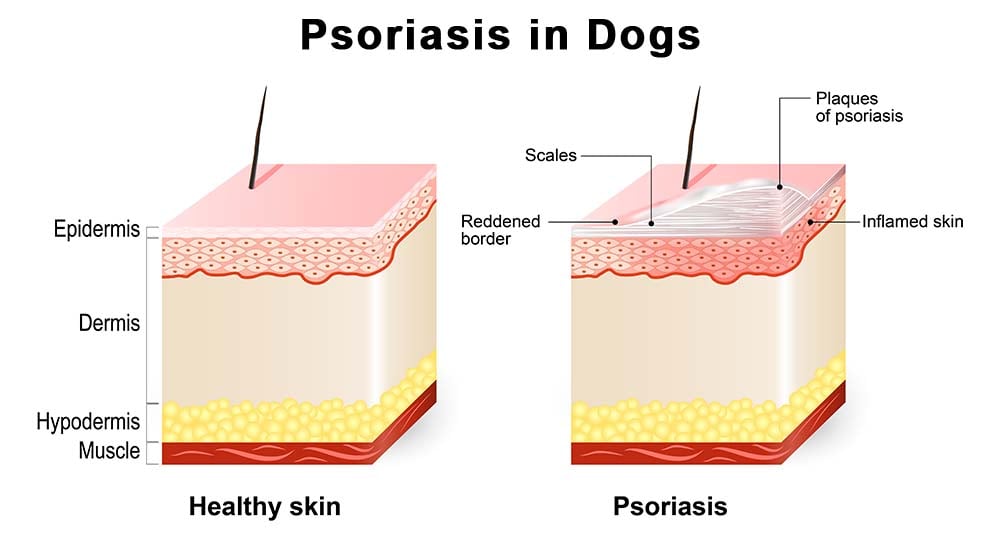Table of Contents
Many dogs may suffer from allergic reactions or malnutrition that significantly affect their skin, coat, and overall health. Fortunately, dog psoriasis is one of the less harmful and rare, with so many skin conditions that can affect your pooch.
However, while the condition in itself isn't dangerous, it's a sign that your pet's immune system has been compromised.
While psoriasis in dogs is very rare, studies have observed it in some isolated cases. The difference between psoriasis versus most other skin conditions in dogs is that a disorder causes it.
Psoriasis in dogs is simply an external manifestation of the real problem that's affecting the pet internally.
It is not contagious and won't be dangerous to other animals or people your dog is exposed to.
Because dog psoriasis is very uncommon, it may often be confused with other types of skin disorders.
This can be detrimental to maintaining the dog’s health because if the true condition is not identified, your pup can suffer lasting effects, which can be long-term or short-term, depending on the severity of each case.
What is Dog Psoriasis?
Psoriasis is a skin condition that can affect dogs and people. It is caused by an autoimmune disorder that can last for long or short periods of time-based on the underlying cause.
When the dog's immune system is compromised, it begins to attack healthy cells, causing cell abnormalities and buildup.
The dog's body then begins to overproduce these cells, leading to thick patches of skin cells that are easily irritated and inflamed.
This is what dog psoriasis looks like up close:

Psoriasis in dogs will often cause the texture and color of their skin to change, leading it to become scaly, itchy, and irritable and develop red patches.
As the layers of skin are damaged, it can increase the chances of the dog developing a secondary infection, as they will often scratch at and mess with the open wounds.
Psoriasis in dogs can affect only a small portion or spot on the body or, in severe cases, spread across the dog’s entire body.
Luckily, dog psoriasis is not contagious or dangerous to other pets or people who contact the affected animal.
Because of this, it is frequently overlooked and considered a minor condition. Still, due to its effects on the skin, it is important to get treatment from the vet before additional complications can occur.
When dogs suffer from psoriasis, they are more at risk of other infections because their immune system is already compromised.
Psoriasis can affect any dog regardless of breed, gender, age, or genetic makeup.
The only condition that dog psoriasis relies upon to develop and show on the skin is that the animal is immune-compromised.
However, studies found that psoriasis is more common among certain breeds:
- West Highland Terrier
- Spaniels
- Standard Poodles
- Chinese Shar-Pei
- American Bulldogs
- Doberman Pinschers
- English Bulldogs
- Labrador Retrievers
- Pit Bull Terriers
- Golden Retrievers
Symptoms and Diagnosis of Psoriasis in Dogs
Psoriasis is a chronic skin condition where the immune system is weakened or compromised because of an accelerated division of the dog’s T-cells.
This accumulation of skin cells can cause rashes, flakiness, and itchiness on the surface of the dog’s skin.
The most common signs and symptoms associated with dog psoriasis and experienced by dogs suffering from psoriasis are:
- Excessive dandruff
- Excessive itchiness
- Red patches
- Scaly patches located on the
- Scalp
- Sacral areas
- Tips of elbows
- Legs
- Development of scales (silver in color)
- Possible genetic factors
- Environmental factors (allergies)
The animal's sensitivity to allergens often causes dog psoriasis. Therefore the owner needs to identify any potential allergens in your pet's environment.
It can also be caused by the dog’s inherited genes that are predisposed to developing psoriasis.
Learning about your dog’s breed or genetic makeup through DNA tests can help you understand why psoriasis occurs.
The symptoms related to psoriasis can sometimes be confused with other skin conditions such as seborrheic dermatitis, eczema, and food allergies.
To guarantee that your dog receives the proper treatment and diagnosis, you must take them to the vet. It may also be useful in determining the cause of the dog’s compromised immune system.
For an official diagnosis, a vet will search the dog for scaly, dry, red, or silvery patches of the skin.
They will identify the sources of the dog’s itching and bleeding or cracked spots on the skin due to the dog’s excessive itching.
The vet may also require a sample of the dog’s skin to examine and determine whether further testing is needed.
How to Treat Dog Psoriasis
Because psoriasis in dogs is very rare, there aren't many methods that have been specifically developed for treating psoriasis in dogs.
However, one 2015 study found that dogs respond well to the same psoriasis treatments as humans.
Like many other skin conditions, the best way to treat dog psoriasis is topically and internally.
The goal is to heal the topical wounds and cure the underlying condition while rebuilding the dog’s compromised immune system.
There are a few things you can do at home as the owner of your dog.
1. Topical Treatments
First, apply a topical cream for dog psoriasis and gentle shampoo to the dog’s skin and coat. You may also use a daily moisturizer for dry or cracked skin to reduce irritation.
Try finding and using products that contain coal, tar, or sulfur, as these can calm your dog's skin’s irritation and reduce itchiness.
Products that contain potassium, permanganate, or primrose oil can assist in clearing up the patches of sore skin and making them less itchy.
Some of the best topical products for psoriasis in dogs are:
| Preview | Product | Rating | |
|---|---|---|---|

|
Zymox Veterinarian Strength Topical Cream with 1%... | 3,384 Reviews | Check Price |

|
Veterinary Formula Clinical Care Hot Spot & Itch... | 31,489 Reviews | Check Price |

|
Pet MD Hydrocortisone Spray for Dogs, Cats, Horses... | 12,233 Reviews | Check Price |
2. Changes in Diet
Changing the dog’s diet may also assist in easing their symptoms and preventing future break-outs, and there are many sensitive skin brands with ingredients specifically affecting skin conditions.
When your pet relies upon a diet of unprocessed and natural foods, they have a greater chance of removing any allergens that may be causing allergic reactions related to their psoriasis.
Stay away from dog foods that are heavily processed and contain more filler than actual substances, as those are likely to cause skin conditions.
Instead, feed your pooch dog food that is low in carbs, high in protein, and moderate to high in fiber.
Avoid feeding your dog things like:
- by-products
- flour (wheat, rice)
- gluten (wheat, corn)
- cornmeal
- preservatives (Ethoxyquin, BHT, BHA)
Instead, picking dog food brands with limited ingredients focused on more fiber and protein is the way to go. The best foods for dogs with sensitive skin:
| Preview | Product | Rating | |
|---|---|---|---|

|
Hill's Pet Nutrition Science Diet Dry Dog Food,... | 18,163 Reviews | Check Price |

|
DIAMOND CARE Grain-Free Formulation Adult Dry Dog... | 509 Reviews | Check Price |

|
Purina Pro Plan Sensitive Skin and Stomach Dog... | 23,135 Reviews | Check Price |
3. Dietary Supplements
While diet and dog food are far more important for treating dog psoriasis, adding dietary supplements to your pup's daily meal may also help control, contain, and possibly eliminate psoriasis.
It would help if you focused on supplements that have been proven to assist with compromised immune systems in dogs. Some of these supplements are:
- Zinc
- Omega-3 fatty acids
- Omega-6 fatty acids
- Vitamin C
Some of the brands of dog supplements you may want to try:
| Preview | Product | Rating | |
|---|---|---|---|

|
Zesty Paws Allergy & Immune Supplement for Dogs -... | 75,500 Reviews | Check Price |

|
NaturVet All-in-One Dog Supplement - for Joint... | 11,673 Reviews | Check Price |

|
Omega 3 for Dogs - Fish Oil for Dogs Skin and Coat... | 3,169 Reviews | Check Price |
Letting the dog spend more time outside will boost their Vitamin D levels. Studies show that dogs with higher Vitamin D levels are less likely to develop skin disorders than dogs that spend their time mainly indoors.
Vitamin D is known to support healthy skin and tissue in canines, so increasing the dog’s time outdoors may benefit their skin health and help with dog psoriasis condition.
How to Prevent Psoriasis in Dogs
Preventing psoriasis in dogs consists of mainly building up and strengthening their immune system.
Psoriasis will only develop in dogs with a weak or compromised immune system, and if your dog's body is properly supported, it will greatly reduce the risk of psoriasis.
If your pooch is believed to be at risk for psoriasis (genetically predisposed), you may want to consult with a vet and start making some preliminary changes to their diet to prevent psoriasis breakouts.
Give them supplements mentioned above, those rich in vitamin C, zinc, and Omega-3s and -6s to strengthen their immune system.
Additionally, feeding your pet a diet that consists of high-quality foods and fulfills their needs without the presence of sugar, salt, bulking agents, additives, colorants, and preservatives is extremely helpful.
Dogs should be walked and allowed outside frequently to increase their exposure to vitamin D.
When dogs get enough nutrients and vitamins from the diet and environment, they are less likely to develop internal issues and suffer from psoriasis.
Psoriasis in Humans and Dogs
Psoriasis is commonly known as an infection that affects humans, even if it is not heard of in dogs.
Most causes of both human and dog psoriasis are surprisingly similar, making it easier for owners to memorize and identify them.
Both can be caused by a weakened or compromised immune system, excess cell creation, allergies, and genetic disposition to the disease.
Humans and dogs also share common symptoms as both can suffer from excessive and persistent flaky scaling, red patches, scaly skin patches, persistent itchiness, and silvery and red-colored scales.
Whether a human or a dog has psoriasis, it is not contagious to the same species or across species.
 Psoriasis in dogs and humans differs the most in that human psoriasis will appear in various ways and affect people at certain ages.
Psoriasis in dogs and humans differs the most in that human psoriasis will appear in various ways and affect people at certain ages.
The type that is most similar to canine psoriasis is plaque psoriasis.
Humans can be diagnosed with psoriasis during their childhood or adulthood and with inverse psoriasis or erythrodermic psoriasis (which is very rare).
These conditions affect different body parts, such as the armpits and groin or large sections of the entire body.
While dogs are limited in their psoriasis experience and do not have as many symptoms and types, humans have a few symptoms that dogs do not experience.
This includes humans being prone to have swollen, painful joints and pitted, thick nails. Fortunately, you don't have to worry about this regarding your dog's psoriasis condition.
READ NEXT: 9 Ways to Improve Your Dog’s Skin and Coat Health
Disclosure: We may earn affiliate commissions at no cost to you from the links on this page. This did not affect our assessment of products. Read more here and find full disclosure here.















